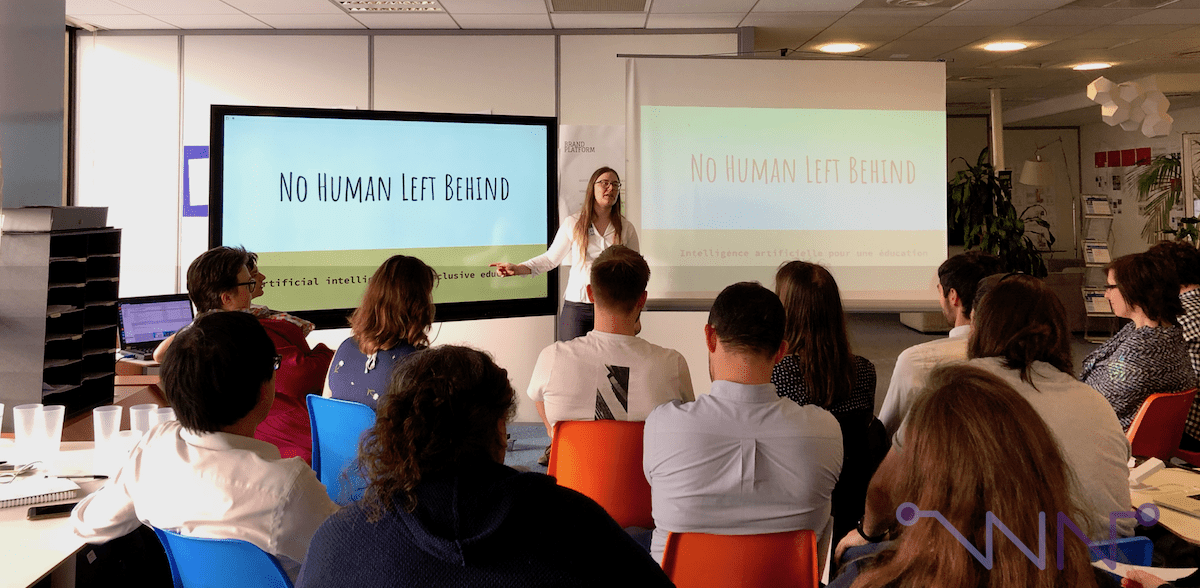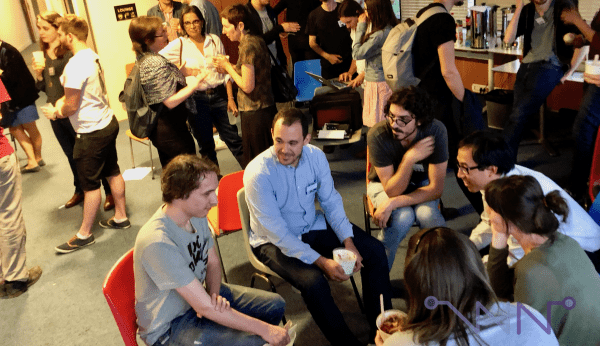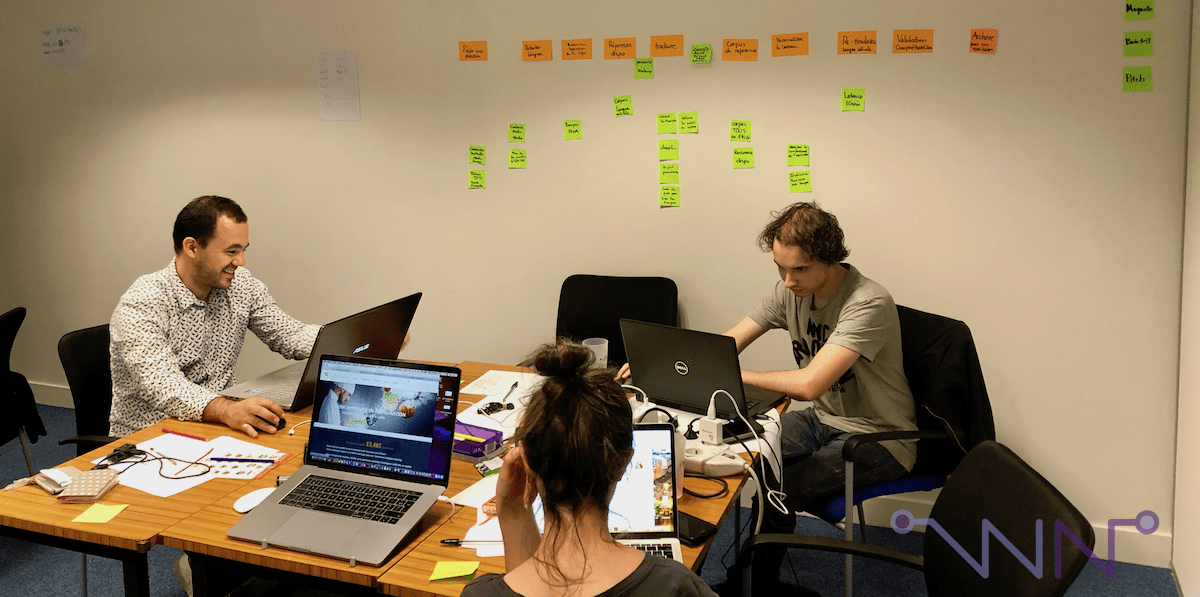I participated in a hackathon Artificial Intelligence for Inclusive Education
on 14 May 2018
Last February, when I was starting this blog, a friend contacted me about the #NoHumanLeftBehind hackathon organized at the Center for Interdisciplinary Research (CRI) on the weekend of May 11-13, telling me that I might be interested in it as part of Whirlwind Neurosciences, the branch of my activity that aims to develop Neurofeedback material. As time passed, I got behind with projects that were added, so I had no project to propose for the hackathon. With little conviction, last week, I nevertheless registered (at 10€, after all....) and I went there for discovery on Friday evening at 18h, thinking that I could join an existing project.
The theme Artificial Intelligence for Inclusive Education spoke to me: I have a good knowledge of technological innovation, I loved the years I was able to teach, and inclusiveness is a theme that speaks to me, being disabled. But let's get back to basics.
The word hackathon refers to an event where a group of volunteer developers gather to do collaborative computer programming, over several days. It is a creative process frequently used in the field of digital innovation. (...) The term is a suitcase word consisting of hack and marathon. The reference to the "Marathon" is justified by the continuous work of the developers during two days, generally during a weekend.
The hackathon is originally a gathering of developers, usually organized in teams, by or around one or more project leaders with the common goal of testing an idea and producing an application prototype in a few hours. In the form of a timed competition, the winning team is generally chosen by a jury at the end of the time allotted.
It is generally part of perspectives of co-design, economy of sharing and collaborative economy.
Given the definition of the word hackathon, there are several problems:
- I'm not a seasoned developer (I developed this site, but it's still basic - a little advanced, ok -) ;
- I didn't feel I had the skills to join an existing project;
- I did not see what I could bring (it is difficult to value a thesis on the mouse...).
But this is the main cognitive bias in innovation: everyone can participate. As I often say, in the lab when I was stuck with a problem, I would discuss it with someone outside about me: by dint of being specialized in a subject, we sometimes forget simple things, simple things that someone outside will very quickly point out and thus unblock all the reasoning.

So I left for the CRI, on the twentieth floor of the Montparnasse Tower. I was able to meet a person at the reception who also went there, it was the occasion to start to break the ice. When we arrived, a game was proposed: forming a group and defining the outlines of a Persona (yes, that was the beginning of a long list of words I learned over the weekend) that could benefit from artificial intelligence as part of an inclusive education. The Human being what he is, we drowned with the person we met in the elevator (hello cognitive familiarity bias) in a pre-existing group.
It was an opportunity to meet people, see some of the profiles present and wait for the hackathon presentation.

We started with a description of the CRI: a non-profit association, which offers university courses (bachelor's and master's degrees) in joint ventures with French universities. The credo? Transdisciplinarity at the frontiers of life. I could write a full article on the CRI, so feel free to just check out their site. I didn't know it, but I will follow their actions more closely now. The transdisciplinarity that is the basis of the project is really refreshing, placing more emphasis on the encounter between different fields of research, rather than on specialization (which is the traditional model of the University).

I finally decided to join one of Skillogs' projects, a young startup who created an e-learning platform using artificial intelligence to adapt the course to each student's difficulties. One project was interested in finding a way to make training more accessible to dyslexics, the other in finding a way to get a student to communicate with a teacher who does not speak the same language.
I chose this internationalization project because I have been preparing an article, for a few weeks, on How to read science when you don't speak English ? (coming soon ^^) The objective being for me to explain to you that reading science is neither complicated nor impossible if you don't speak English.
Friday evening was an opportunity to discuss a bit about Skillogs: Raphaël, co-founder of Skillogs and project leader, explained to us what he wanted: to allow a student to chat in real time with a teacher who does not speak his language, by not using automatic translation (Yes, Google Translate has traumatized an entire generation......). We were 5 and had 48 hours.
And this is exactly what I told you at the beginning of the article: the group only brought Raphaël a simple approach by bringing him what he had rejected from the start: an automatic translation fed by a little machine learning and human correction, in the necessary cases. Where the giants of the web (Google, Apple, Facebook....) are unable to offer quality machine translation, what could a group of 5 people do in 48 hours? Clearly, not better...... although......
We could be creative and pool our resources. For example, I brought the idea of DeepL, an online translator that works much better than Google Translate. Together, we tested DeepL, to define the limits and find a way around them. It is finally Samah, a hackathon mentor who will bring us the technical solution, on Saturday evening, by explaining us a little more what the machine learning was. I won't go into the details of what was then put in place (after all, it belongs to Skillogs), but we have all found elegant solutions to the problems that have arisen.

And it is also and especially that which I retain: even if one has the impression of not having the skills, one can help. The fact that I had been testing DeepL for you for several weeks, helped. The fact that I know how the web giants work (including how they pump your data to improve their algorithms), helped. Because a small box, can also use the data of its users to feed its algorithms. We just found a much more ethical and useful way to do it.
In fact, what I remember most is that all the time I spend reading hi-tech articles and questioning myself about private life issues, brought to this project. Finally, we hope, even if we did a little proof of concept that was presented at the end of the hackathon, nothing tells us that it will be exploitable at Skillogs scale.
But the objective was not so much that, it is more the human experience that counts. Meeting people from different backgrounds, pooling our skills, each taking a piece of the problem to help us move forward faster - we had 48h -. Where Anh brought his organisational skills, Augustin collected the necessary data for the project, while Raphaëlle made the presentations, while I looked with Samah at the technical feasibility of the solution. We all contributed and, in my opinion, learned a lot during these two days.

No doubt that I would follow Skillogs closely, to see if our idea leads to a viable solution and that I will sign up for the next CRI hackathon...... or other hackathon.
A big thank you to Emma too, who magnificently organized the weekend:
- we ate well (thanks to Skillogs who took care of the meals!) ;
- we've had top mentors;
- we had a team of organizers/volunteers at the top;
- the people were nice and inspiring.
Did you like this article? Then support the blog and share it with your friends by clicking on the buttons* below :
Article url :
http://en.chaussenot.net/hackathon-intelligence-artificielle-education-inclusive
* These sharing buttons are respectful of your privacy and avoid tracking by social networks.



